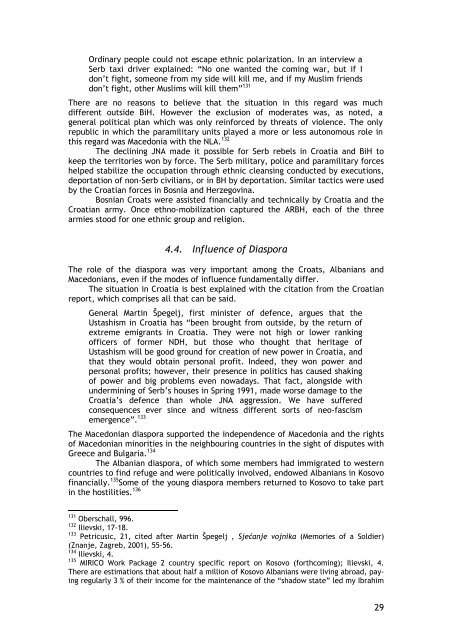Synthetic report - EURAC
Synthetic report - EURAC
Synthetic report - EURAC
You also want an ePaper? Increase the reach of your titles
YUMPU automatically turns print PDFs into web optimized ePapers that Google loves.
Ordinary people could not escape ethnic polarization. In an interview a<br />
Serb taxi driver explained: “No one wanted the coming war, but if I<br />
don’t fight, someone from my side will kill me, and if my Muslim friends<br />
don’t fight, other Muslims will kill them” 131<br />
There are no reasons to believe that the situation in this regard was much<br />
different outside BiH. However the exclusion of moderates was, as noted, a<br />
general political plan which was only reinforced by threats of violence. The only<br />
republic in which the paramilitary units played a more or less autonomous role in<br />
this regard was Macedonia with the NLA. 132<br />
The declining JNA made it possible for Serb rebels in Croatia and BiH to<br />
keep the territories won by force. The Serb military, police and paramilitary forces<br />
helped stabilize the occupation through ethnic cleansing conducted by executions,<br />
deportation of non-Serb civilians, or in BH by deportation. Similar tactics were used<br />
by the Croatian forces in Bosnia and Herzegovina.<br />
Bosnian Croats were assisted financially and technically by Croatia and the<br />
Croatian army. Once ethno-mobilization captured the ARBH, each of the three<br />
armies stood for one ethnic group and religion.<br />
4.4. Influence of Diaspora<br />
The role of the diaspora was very important among the Croats, Albanians and<br />
Macedonians, even if the modes of influence fundamentally differ.<br />
The situation in Croatia is best explained with the citation from the Croatian<br />
<strong>report</strong>, which comprises all that can be said.<br />
General Martin Špegelj, first minister of defence, argues that the<br />
Ustashism in Croatia has “been brought from outside, by the return of<br />
extreme emigrants in Croatia. They were not high or lower ranking<br />
officers of former NDH, but those who thought that heritage of<br />
Ustashism will be good ground for creation of new power in Croatia, and<br />
that they would obtain personal profit. Indeed, they won power and<br />
personal profits; however, their presence in politics has caused shaking<br />
of power and big problems even nowadays. That fact, alongside with<br />
undermining of Serb’s houses in Spring 1991, made worse damage to the<br />
Croatia’s defence than whole JNA aggression. We have suffered<br />
consequences ever since and witness different sorts of neo-fascism<br />
emergence”. 133<br />
The Macedonian diaspora supported the independence of Macedonia and the rights<br />
of Macedonian minorities in the neighbouring countries in the sight of disputes with<br />
Greece and Bulgaria. 134<br />
The Albanian diaspora, of which some members had immigrated to western<br />
countries to find refuge and were politically involved, endowed Albanians in Kosovo<br />
financially. 135 Some of the young diaspora members returned to Kosovo to take part<br />
in the hostilities. 136<br />
131<br />
Oberschall, 996.<br />
132<br />
Ilievski, 17-18.<br />
133<br />
Petricusic, 21, cited after Martin Špegelj , Sjećanje vojnika (Memories of a Soldier)<br />
(Znanje, Zagreb, 2001), 55-56.<br />
134<br />
Ilievski, 4.<br />
135<br />
MIRICO Work Package 2 country specific <strong>report</strong> on Kosovo (forthcoming); Ilievski, 4.<br />
There are estimations that about half a million of Kosovo Albanians were living abroad, paying<br />
regularly 3 % of their income for the maintenance of the “shadow state” led my Ibrahim<br />
29

















